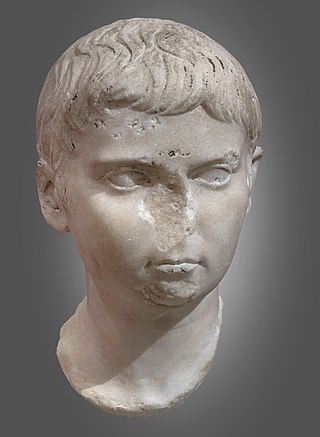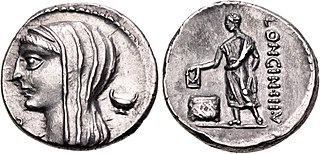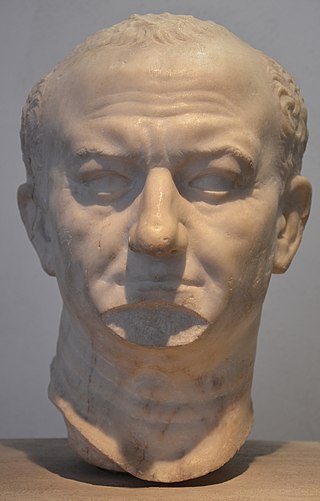Related Research Articles

Marcus Antonius, commonly known in English as Mark Antony, was a Roman politician and general who played a critical role in the transformation of the Roman Republic from a constitutional republic into the autocratic Roman Empire.

Marcus Agrippa Postumus, later named Agrippa Julius Caesar, was a grandson of Roman Emperor Augustus. He was the youngest child of Marcus Vipsanius Agrippa and Julia the Elder. Augustus initially considered Postumus as a potential successor and formally adopted him as his heir, before banishing Postumus from Rome in AD 6 on account of his ferocia. In effect, though not in law, the action cancelled his adoption and virtually assured Tiberius' emplacement as Augustus' sole heir. Postumus was ultimately executed by his own guards shortly after Augustus' death in AD 14.

Gaius Caesar was the grandson and heir to the throne of Roman emperor Augustus, alongside his younger brother Lucius Caesar. Although he was born to Marcus Vipsanius Agrippa and Julia, Augustus' only daughter, Gaius and his younger brother, Lucius Caesar, were raised by their grandfather as his adopted sons and joint-heirs to the empire. He would experience an accelerated political career befitting a member of the Julio-Claudian dynasty, with the Roman Senate allowing him to advance his career without first holding a quaestorship or praetorship, offices that ordinary senators were required to hold as part of the cursus honorum.

The gens Julia was one of the most prominent patrician families in ancient Rome. Members of the gens attained the highest dignities of the state in the earliest times of the Republic. The first of the family to obtain the consulship was Gaius Julius Iulus in 489 BC. The gens is perhaps best known, however, for Gaius Julius Caesar, the dictator and grand uncle of the emperor Augustus, through whom the name was passed to the so-called Julio-Claudian dynasty of the first century AD. The nomen Julius became very common in imperial times, as the descendants of persons enrolled as citizens under the early emperors began to make their mark in history.

The gens Cassia was a Roman family of great antiquity. The earliest members of this gens appearing in history may have been patrician, but all those appearing in later times were plebeians. The first of the Cassii to obtain the consulship was Spurius Cassius Vecellinus, in 502 BC. He proposed the first agrarian law, for which he was charged with aspiring to make himself king, and put to death by the patrician nobility. The Cassii were amongst the most prominent families of the later Republic, and they frequently held high office, lasting well into imperial times. Among their namesakes are the Via Cassia, the road to Arretium, and the village of Cassianum Hirpinum, originally an estate belonging to one of this family in the country of the Hirpini.

Lucius Antonius was the younger brother and supporter of Mark Antony, a Roman politician. He was nicknamed Pietas as a young man.
Gaius Antonius Hybrida was a politician of the Roman Republic. He was the second son of Marcus Antonius and brother of Marcus Antonius Creticus; his mother is unknown. He was also the uncle of the famed triumvir Mark Antony. He had two children, Antonia Hybrida Major and Antonia Hybrida Minor.

Lucius Caesar was a grandson of Augustus, the first Roman emperor. The son of Marcus Vipsanius Agrippa and Julia the Elder, Augustus' only daughter, Lucius was adopted by his grandfather along with his older brother, Gaius Caesar. As the emperor's adopted sons and joint-heirs to the Roman Empire, Lucius and Gaius had promising political and military careers. However, Lucius died of a sudden illness on 20 August 2 AD, in Massilia, Gaul, while traveling to meet the Roman army in Hispania. His brother Gaius also died at a relatively young age on 21 February 4 AD. The untimely loss of both heirs compelled Augustus to redraw the line of succession by adopting Lucius' younger brother, Agrippa Postumus as well as his stepson, Tiberius on 26 June 4 AD.

The gens Flavia was a plebeian family at ancient Rome. Its members are first mentioned during the last three centuries of the Republic. The first of the Flavii to achieve prominence was Marcus Flavius, tribune of the plebs in 327 and 323 BC; however, no Flavius attained the consulship until Gaius Flavius Fimbria in 104 BC. The gens became illustrious during the first century AD, when the family of the Flavii Sabini claimed the imperial dignity.
Lucius Aurelius Cotta was a Roman politician from an old noble family who held the offices of praetor, consul and censor. Both his father and grandfather of the same name had been consuls, and his two brothers, Gaius Aurelius Cotta and Marcus Aurelius Cotta, preceded him as consul in 75 and 74 BC respectively. His sister, Aurelia, was married to Gaius Julius Caesar, brother-in-law to Gaius Marius and possibly Lucius Cornelius Sulla, and they were the parents of the famous general and eventual dictator, Gaius Julius Caesar.
Lucius Caesetius Flavus was a Roman politician and tribune of the people. He is best known for his involvement in the diadem incident just before the assassination of Julius Caesar.
Lucius Cornelius Cinna was a politician in the Roman Republic. He came from a noble family which had gained prominence during the civil wars of the 80s BC, but lost their political rights for opposing the dictator Sulla. Cinna sought better fortune for himself by joining the failed rebellions of Lepidus and Sertorius in the 70s BC, but was recalled to Rome and granted amnesty with the support of his brother-in-law, Julius Caesar. Cinna remained debarred from public office, however, an impediment only rescinded by Caesar when he crossed the Rubicon and took control of Rome in 49 BC.

Julius Caesar was assassinated by a group of senators on the Ides of March of 44 BC during a meeting of the Senate at the Curia of Pompey of the Theatre of Pompey in Rome where the senators stabbed Caesar 23 times. They claimed to be acting over fears that Caesar's unprecedented concentration of power during his dictatorship was undermining the Roman Republic. At least 60 to 70 senators were party to the conspiracy, led by Marcus Junius Brutus, Gaius Cassius Longinus, and Decimus Junius Brutus Albinus. Despite the death of Caesar, the conspirators were unable to restore the institutions of the Republic. The ramifications of the assassination led to his martyrdom, the Liberators' civil war and ultimately to the Principate period of the Roman Empire.

The constitutional reforms of Julius Caesar were a series of laws to the Constitution of the Roman Republic enacted between 49 and 44 BC, during Caesar's dictatorship. Caesar was murdered in 44 BC before the implications of his constitutional actions could be realized.
The gens Caesetia was a minor plebeian family at ancient Rome. It is known from a small number of individuals living during the late Republic.
The gens Titia was a plebeian family at ancient Rome. The gens is rarely mentioned in the Republican period, and did not rise out of obscurity till a very late time. None of its members obtained the consulship under the Republic, and the first person of the name who held this office was Marcus Titius in BC 31.
Tiberius Canutius or Cannutius was tribune of the plebs in 44 BC, the year of Caesar's assassination. As a supporter of the senatorial party, he opposed the triumvirs, resorting to military force during the Perusine War. He was captured and put to death by Octavianus in 40 BC.
The gens Decimia was a plebeian family at ancient Rome. Members of this gens are first mentioned towards the end of the third century BC, participating on the Roman side during the Second Punic War.
The gens Epidia was an obscure plebeian family at ancient Rome. The only members to achieve any importance lived during the first century BC.
Sextus Julius Caesar was a Roman statesman, and the first member of the Julii Caesares to hold the consulship, which he attained in 157 BC.
References
- 1 2 3 Licona, Mike (2017). Why are There Differences in the Gospels?: What We Can Learn from Ancient Biography. Oxford University Press. pp. 87–88. ISBN 978-0-19-026426-0.
- ↑ Cocceianus, Cassius Dio (1905). Dio's Annals of Rome. Pafraets book Company. p. 415.